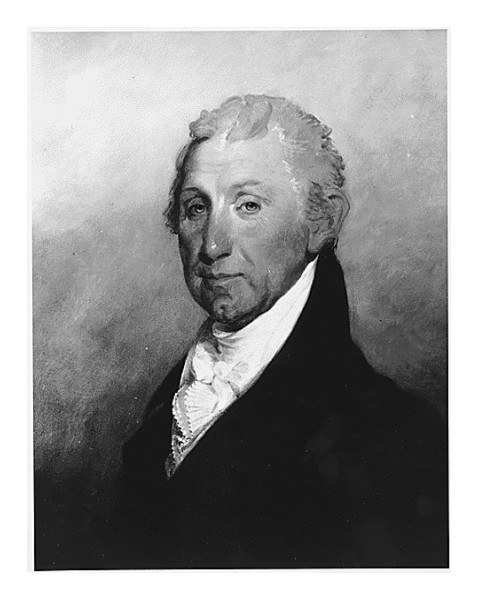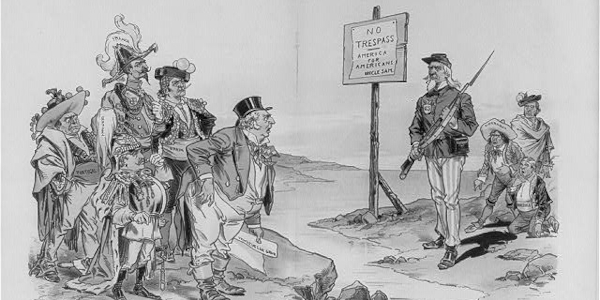
Image above: President James Monroe. Image right: Triumph, depicting eventual victory of Union, with reference to the Missouri Compromise. Created by Morris H. Traubel, 1861. Images courtesy Library of Congress.
Sponsor this page for $75 per year. Your banner or text ad can fill the space above.
Click here to Sponsor the page and how to reserve your ad.
-
Timeline
1823 Detail
December 2, 1823 - In a speech before Congress, James Monroe announces the Monroe Doctrine, stating the policy that European intervention anyplace in the Americas is opposed and that he would establish American neutrality in future European wars.

It was part of a State of the Union speech, President James Monroe's 7th, spoken on December 2, 1823, and would go forward to form the basis for American diplomacy in their own hemisphere from that date forward. Oddly enough, the speech was not written by Monroe himself. It was from the pen of John Quincy Adams, then Secretary of State. Both he, and Monroe, had become concerned with European nations efforts to meddle in the affairs of neighbors too close to the United States for comfort. Not that this was new. It had been going on for long before the American Revolution and the United States was in existence. Ever since Spain had sent Columbus to search for the Orient, but found the Americas instead, had Europe meddled in the Americas. Between Spain, France, England, and the Dutch, colonization and control had been a European goal. But now, with the United States now thirty years old, that doctrine, according to the U.S. President, must change, even if they did not have the ability to enforce it.
There would no longer be toleration of their colonial efforts, or the establishment of puppet leaders in nations of the western hemisphere that were beholden to European nations, whether allies of the United States at the moment or not. This policy had been in tacit effect since the administration of George Washington, but in more of an isolationist stance. The United States would stay out of Europe in hopes that it would be reciprocated in the Americas.
While it had been a goal since the beginning of the democracy, in actuality, European powers had colonial control over more of the Americas than did the United States itself. However, by the time of the Monroe administration, many colonies in Latin America were beginning to gain their independence from Spain and Portugal, thus paving the way for the United States to expand its interests from North America to Latin America.
What did other nations think of it at the time? Most disregarded it. The United States did not have a Navy strong enough to enforce all its goals. One European nation, however, tacitly agreed. Great Britain wanted to keep their American trading alliance out of the hands of their European competitors. For years, it was the British Navy who would enforce its tenants.
Full Text, Monroe Doctrine
. . . At the proposal of the Russian Imperial Government, made through the minister of the Emperor residing here, a full power and instructions have been transmitted to the minister of the United States at St. Petersburg to arrange by amicable negotiation the respective rights and interests of the two nations on the northwest coast of this continent. A similar proposal has been made by His Imperial Majesty to the Government of Great Britain, which has likewise been acceded to. The Government of the United States has been desirous by this friendly proceeding of manifesting the great value which they have invariably attached to the friendship of the Emperor and their solicitude to cultivate the best understanding with his Government. In the discussions to which this interest has given rise and in the arrangements by which they may terminate the occasion has been judged proper for asserting, as a principle in which the rights and interests of the United States are involved, that the American continents, by the free and independent condition which they have assumed and maintain, are henceforth not to be considered as subjects for future colonization by any European powers. ...
It was stated at the commencement of the last session that a great effort was then making in Spain and Portugal to improve the condition of the people of those countries, and that it appeared to be conducted with extraordinary moderation. It need scarcely be remarked that the results have been so far very different from what was then anticipated. Of events in that quarter of the globe, with which we have so much intercourse and from which we derive our origin, we have always been anxious and interested spectators. The citizens of the United States cherish sentiments the most friendly in favor of the liberty and happiness of their fellow-men on that side of the Atlantic. In the wars of the European powers in matters relating to themselves we have never taken any part, nor does it comport with our policy to do so. It is only when our rights are invaded or seriously menaced that we resent injuries or make preparation for our defense. With the movements in this hemisphere we are of necessity more immediately connected, and by causes which must be obvious to all enlightened and impartial observers. The political system of the allied powers is essentially different in this respect from that of America. This difference proceeds from that which exists in their respective Governments; and to the defense of our own, which has been achieved by the loss of so much blood and treasure, and matured by the wisdom of their most enlightened citizens, and under which we have enjoyed unexampled felicity, this whole nation is devoted. We owe it, therefore, to candor and to the amicable relations existing between the United States and those powers to declare that we should consider any attempt on their part to extend their system to any portion of this hemisphere as dangerous to our peace and safety. With the existing colonies or dependencies of any European power we have not interfered and shall not interfere. But with the Governments who have declared their independence and maintain it, and whose independence we have, on great consideration and on just principles, acknowledged, we could not view any interposition for the purpose of oppressing them, or controlling in any other manner their destiny, by any European power in any other light than as the manifestation of an unfriendly disposition toward the United States. In the war between those new Governments and Spain we declared our neutrality at the time of their recognition, and to this we have adhered, and shall continue to adhere, provided no change shall occur which, in the judgement of the competent authorities of this Government, shall make a corresponding change on the part of the United States indispensable to their security.
The late events in Spain and Portugal shew that Europe is still unsettled. Of this important fact no stronger proof can be adduced than that the allied powers should have thought it proper, on any principle satisfactory to themselves, to have interposed by force in the internal concerns of Spain. To what extent such interposition may be carried, on the same principle, is a question in which all independent powers whose governments differ from theirs are interested, even those most remote, and surely none of them more so than the United States. Our policy in regard to Europe, which was adopted at an early stage of the wars which have so long agitated that quarter of the globe, nevertheless remains the same, which is, not to interfere in the internal concerns of any of its powers; to consider the government de facto as the legitimate government for us; to cultivate friendly relations with it, and to preserve those relations by a frank, firm, and manly policy, meeting in all instances the just claims of every power, submitting to injuries from none. But in regard to those continents circumstances are eminently and conspicuously different.
It is impossible that the allied powers should extend their political system to any portion of either continent without endangering our peace and happiness; nor can anyone believe that our southern brethren, if left to themselves, would adopt it of their own accord. It is equally impossible, therefore, that we should behold such interposition in any form with indifference. If we look to the comparative strength and resources of Spain and those new Governments, and their distance from each other, it must be obvious that she can never subdue them. It is still the true policy of the United States to leave the parties to themselves, in hope that other powers will pursue the same course. ...
Image above: James Monroe, 1817, Charles Bird King. Courtesy Library of Congress. Image below: Cartoon named, "Keep off! The Monroe Doctrine must be respected," 1896, Victor. Courtesy Library of Congress. Source Info: The Avalon Project, Documents in Law, Diplomacy, and History, Yale Law School; ourdocuments.gov; Wikipedia Commons.

History
Photo Bomb
. . . At the proposal of the Russian Imperial Government, made through the minister of the Emperor residing here, a full power and instructions have been transmitted to the minister of the United States at St. Petersburg to arrange by amicable negotiation the respective rights and interests of the two nations on the northwest coast of this continent. A similar proposal has been made by His Imperial Majesty to the Government of Great Britain, which has likewise been acceded to. The Government of the United States has been desirous by this friendly proceeding of manifesting the great value which they have invariably attached to the friendship of the Emperor and their solicitude to cultivate the best understanding with his Government. In the discussions to which this interest has given rise and in the arrangements by which they may terminate the occasion has been judged proper for asserting, as a principle in which the rights and interests of the United States are involved, that the American continents, by the free and independent condition which they have assumed and maintain, are henceforth not to be considered as subjects for future colonization by any European powers. ...
It was stated at the commencement of the last session that a great effort was then making in Spain and Portugal to improve the condition of the people of those countries, and that it appeared to be conducted with extraordinary moderation. It need scarcely be remarked that the results have been so far very different from what was then anticipated. Of events in that quarter of the globe, with which we have so much intercourse and from which we derive our origin, we have always been anxious and interested spectators. The citizens of the United States cherish sentiments the most friendly in favor of the liberty and happiness of their fellow-men on that side of the Atlantic. In the wars of the European powers in matters relating to themselves we have never taken any part, nor does it comport with our policy to do so. It is only when our rights are invaded or seriously menaced that we resent injuries or make preparation for our defense. With the movements in this hemisphere we are of necessity more immediately connected, and by causes which must be obvious to all enlightened and impartial observers. The political system of the allied powers is essentially different in this respect from that of America. This difference proceeds from that which exists in their respective Governments; and to the defense of our own, which has been achieved by the loss of so much blood and treasure, and matured by the wisdom of their most enlightened citizens, and under which we have enjoyed unexampled felicity, this whole nation is devoted. We owe it, therefore, to candor and to the amicable relations existing between the United States and those powers to declare that we should consider any attempt on their part to extend their system to any portion of this hemisphere as dangerous to our peace and safety. With the existing colonies or dependencies of any European power we have not interfered and shall not interfere. But with the Governments who have declared their independence and maintain it, and whose independence we have, on great consideration and on just principles, acknowledged, we could not view any interposition for the purpose of oppressing them, or controlling in any other manner their destiny, by any European power in any other light than as the manifestation of an unfriendly disposition toward the United States. In the war between those new Governments and Spain we declared our neutrality at the time of their recognition, and to this we have adhered, and shall continue to adhere, provided no change shall occur which, in the judgement of the competent authorities of this Government, shall make a corresponding change on the part of the United States indispensable to their security.
The late events in Spain and Portugal shew that Europe is still unsettled. Of this important fact no stronger proof can be adduced than that the allied powers should have thought it proper, on any principle satisfactory to themselves, to have interposed by force in the internal concerns of Spain. To what extent such interposition may be carried, on the same principle, is a question in which all independent powers whose governments differ from theirs are interested, even those most remote, and surely none of them more so than the United States. Our policy in regard to Europe, which was adopted at an early stage of the wars which have so long agitated that quarter of the globe, nevertheless remains the same, which is, not to interfere in the internal concerns of any of its powers; to consider the government de facto as the legitimate government for us; to cultivate friendly relations with it, and to preserve those relations by a frank, firm, and manly policy, meeting in all instances the just claims of every power, submitting to injuries from none. But in regard to those continents circumstances are eminently and conspicuously different.
It is impossible that the allied powers should extend their political system to any portion of either continent without endangering our peace and happiness; nor can anyone believe that our southern brethren, if left to themselves, would adopt it of their own accord. It is equally impossible, therefore, that we should behold such interposition in any form with indifference. If we look to the comparative strength and resources of Spain and those new Governments, and their distance from each other, it must be obvious that she can never subdue them. It is still the true policy of the United States to leave the parties to themselves, in hope that other powers will pursue the same course. ...
Image above: James Monroe, 1817, Charles Bird King. Courtesy Library of Congress. Image below: Cartoon named, "Keep off! The Monroe Doctrine must be respected," 1896, Victor. Courtesy Library of Congress. Source Info: The Avalon Project, Documents in Law, Diplomacy, and History, Yale Law School; ourdocuments.gov; Wikipedia Commons.

History
Photo Bomb







